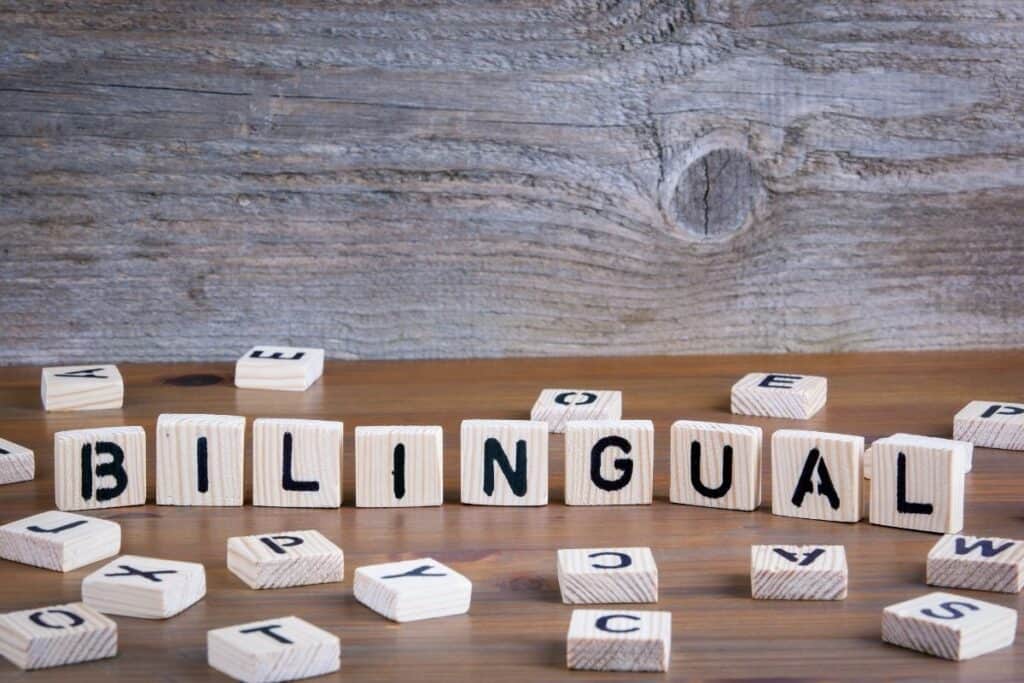
Language is one of the most basic forms of communication, both verbal and written, that allows humans of all cultures, nationalities, and races to connect with one another.
That being said, not everyone worldwide speaks the same language, and so, there are different titles assigned to individuals who can communicate in more than one language, depending on how many they know.
Bilingualism, or being bilingual, means an individual is capable of communicating in two different languages. They could learn both languages simultaneously at a young age or learn one language in addition to their mother language at different points in life. One’s proficiency level in both languages before they’re considered bilingual is highly debated.
While the basics of the bilingual definition are relatively straightforward, many people can’t seem to agree on how well an individual has to master each language before they can claim to be bilingual.
In this article, we will discuss the definition of bilingualism from multiple angles and list some interesting facts about how many people can claim this title worldwide.
How Much of a Language Must You Know to Be Considered Bilingual?
As we stated previously, the basic definition of being bilingual is that a person must be able to communicate in two languages.
However, does that mean any American who walks down the street and can say “hola” is bilingual? At what point can someone confidently claim the titles of fluency, and who decides?
The criteria to which someone has to adhere to in order to be considered bilingual is relatively gray within the community of linguistics and the everyday person. Ultimately, whether or not you are bilingual truly depends on the person and their individual definition of the term.
There are some individuals who believe someone cannot be considered bilingual until they are fluent in both languages.
Of course, this is a debate in of itself.
The Lexico online dictionary defines fluency as ‘the ability to express oneself easily and accurately,’ while YourDictionary.com claims fluency to mean ‘complete knowledge of a foreign language.’
While we understand the rigidity of these definitions ensures the everyday person who can speak a phrase or two doesn’t get to consider themselves bilingual, it would be hard-pressed to say every on earth has ‘complete knowledge’ of their mother language, let alone a foreign language.
Nevertheless, there are many people who don’t hold their definition of bilingual to such high standards. To them, having a basic grasp of both languages and the ability to communicate sufficiently in each with some moderate room for grammar and pronunciation errors is enough to be considered bilingual.
You definitely don’t have to speak at the height of each language’s eloquence, but you should know enough to get through a basic conversation with relative ease and accuracy.
Do You Have to Be Able to Read and Write in Both Languages to be Considered Bilingual?
Another benchmark many people are curious about is whether they need to be able to read and write in both languages in order to be considered bilingual.
While it never hurts to have these skills, proficiency in verbal communication is typically the point most people focus on when discerning if someone is bilingual. There are the linguistic stiffs who claim you must have mastery knowledge of how to speak, read, and write in both languages but I disagree with this point.
In reality, there are a lot of monolingual people who can only speak their mother language and never learned how to read or write. Yet, they are still considered monolingual without these skills, so someone who can speak but not read and write in both languages should be considered bilingual.
How Many People Are Bilingual?
If you’re intrigued by the prospect of becoming bilingual but are uncertain if you’re capable of achieving this goal, the following data might be a boost of motivation.
On a global scale, 40% of the world population is considered monolingual, meaning they only speak one language, 43% are considered bilingual, and the remaining 17% are trilingual (speak three languages) or multilingual languages (speak more than four languages).
So, as you can see, the majority of the world’s population is bilingual. But, of course, these statistics can vary significantly depending on the source where you acquire them and the definition of bilingualism within that source. If they don’t deem someone bilingual unless they can masterfully speak the language without error, the percentage decreases significantly.
Regardless, most individuals worldwide are able to speak more than one language to some degree.
And if they can do it, so can you.
When and Why Do People Learn a Second Language?
Typically, people who are bilingual have learned both languages in their early developmental stages of childhood, when science has previously deemed it easiest for the human mind to grasp multiple languages.
That being said, there are still a decent number of individuals who don’t find their love for a second language until they are taught it in school or traveling to another nation.
There is a growing number of people who have reached native-level fluency in a second language they’ve started learning as an adult. We now know the ease with which children learn languages compared to adults has been massively overblown.
Locations also play a significant role, too. The more nations and varying languages that surround you, it’s more likely you’ll speak multiple languages. Statistically, only about 20% of Americans are bilingual despite bordering Mexico, while 56% of Europeans are bilingual due to the proximity of nations and their varying cultures.
Knowing multiple languages makes communication, travel, business, and cultural appreciation much easier in these nations versus the relatively isolated United States, whose sheer size and social mentalities make it easy for citizens to rely solely on English.
Summary
Regardless of how you define bilingualism, speaking two languages has a myriad of benefits to an individual. It can increase a person’s brainpower, make travel and communication with various people easier, and allow you to have a deeper appreciation for different cultures.
Suppose you’re considering learning a second language… why not consider Mandarin Chinese!
If this interests you, check out the links below.
再见!
Further Reading
- 100+ MANDARIN LEARNING RESOURCES: THE FASTEST WAY TO FLUENCY
- Learn Chinese for FREE | Free Apps, Sites, Courses, and Media
- The 21 Best Apps For Learning Mandarin Chinese
- THE ULTIMATE GUIDE TO LEARNING CHINESE IN CHINA
- 14 REASONS WHY YOU SHOULD LEARN MANDARIN CHINESE
- STUDYING MANDARIN AT A UNIVERSITY IN CHINA: WHAT YOU NEED TO KNOW
- 100+ PODCASTS FOR LEARNING CHINESE | BEGINNER TO ADVANCED MATERIAL
- 101 TV SHOWS FOR CHINESE LEARNERS
